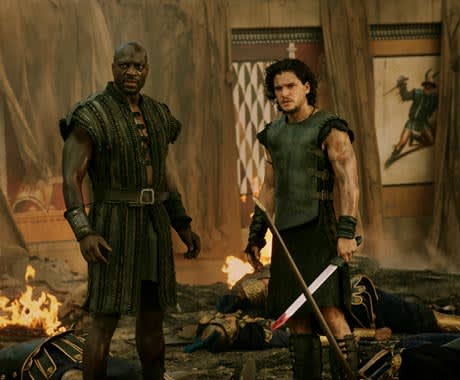One afternoon in 79 A.D., Mount Vesuvius erupted and laid waste to a coastal resort town a couple hundred kilometres south of Rome. This is a thing that happened in a place called Pompeii.
One afternoon in 79 A.D., Mount Vesuvius erupted and acted as the cataclysmic backdrop to a forbidden love affair between a noblewoman and a noble slave caught between the tyranny of a corrupt Imperial order and the unfortunate timing of their sudden infatuation, what with the imminent total annihilation and all. This is the thing that happens in the movie called Pompeii.
The basic formula for this cynical money-hole is Titanic + Gladiator, although there is a surprising amount of The Horse Whisperer in there, too. But, essentially, there is no very good reason to watch this pretend epic at all unless you would like to see poorer versions of any of those previous films. The CGI (in 3D for me) is video-gamey, the acting is wooden (especially from a badly miscast Kiefer Sutherland as a Roman Senator), the plotting is endlessly predictable and the ending is simply preposterous. Indeed, the film is so sharp and ill-lit, and is played out on sets and against CGI so ersatz, that, swear to god, if a porn movie broke out it would be completely in keeping with the aesthetic.
But, what's truly distressing about this movie is how little it cares for any of the vast human suffering it depicts. Apart from main characters like Milo (Kit Harington), Cassia (Emily Browning) and Atticus (an impressive Adewale Akinnuoye-Agbaje), we are invited to care about no one. The people of Pompeii are abstractions, props. Unlike Titanic, in which we were asked to consider the layers of humanity borne on the great doomed vessel, here we are made to understand these "others" as a great undifferentiated mob, soon to be burned up in a fiery cauldron for our amusement. It rends the final 30 minutes of apocalypse amazingly inert; why should you care about a CGI fire sweeping over a CGI city filled with CGI people?
As I sat through this irredeemably shoddy film, several thoughts crawled through my mind (believe me, your attention has time to drift), but chief among them was: why do critics even bother to review director Paul W. S. Anderson's work? The helmer of a long list of excrement-grade actioners, glorified B-movies all, Anderson has made a (dishearteningly lucrative) career out of taking interesting premises and then eviscerating them of all subtext until they become as shallow as a child's bath. This is my last time on the merry-go-round.
(Sony)One afternoon in 79 A.D., Mount Vesuvius erupted and acted as the cataclysmic backdrop to a forbidden love affair between a noblewoman and a noble slave caught between the tyranny of a corrupt Imperial order and the unfortunate timing of their sudden infatuation, what with the imminent total annihilation and all. This is the thing that happens in the movie called Pompeii.
The basic formula for this cynical money-hole is Titanic + Gladiator, although there is a surprising amount of The Horse Whisperer in there, too. But, essentially, there is no very good reason to watch this pretend epic at all unless you would like to see poorer versions of any of those previous films. The CGI (in 3D for me) is video-gamey, the acting is wooden (especially from a badly miscast Kiefer Sutherland as a Roman Senator), the plotting is endlessly predictable and the ending is simply preposterous. Indeed, the film is so sharp and ill-lit, and is played out on sets and against CGI so ersatz, that, swear to god, if a porn movie broke out it would be completely in keeping with the aesthetic.
But, what's truly distressing about this movie is how little it cares for any of the vast human suffering it depicts. Apart from main characters like Milo (Kit Harington), Cassia (Emily Browning) and Atticus (an impressive Adewale Akinnuoye-Agbaje), we are invited to care about no one. The people of Pompeii are abstractions, props. Unlike Titanic, in which we were asked to consider the layers of humanity borne on the great doomed vessel, here we are made to understand these "others" as a great undifferentiated mob, soon to be burned up in a fiery cauldron for our amusement. It rends the final 30 minutes of apocalypse amazingly inert; why should you care about a CGI fire sweeping over a CGI city filled with CGI people?
As I sat through this irredeemably shoddy film, several thoughts crawled through my mind (believe me, your attention has time to drift), but chief among them was: why do critics even bother to review director Paul W. S. Anderson's work? The helmer of a long list of excrement-grade actioners, glorified B-movies all, Anderson has made a (dishearteningly lucrative) career out of taking interesting premises and then eviscerating them of all subtext until they become as shallow as a child's bath. This is my last time on the merry-go-round.
